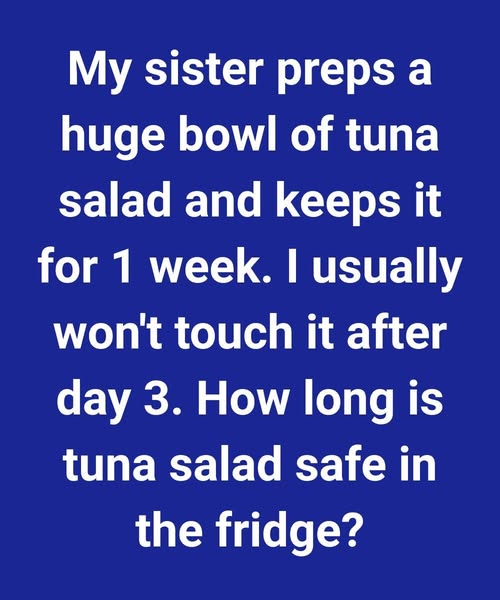“My sister makes a massive bowl of tuna salad and keeps it in the fridge for a whole week. I usually won’t touch it after day three. How long is tuna salad actually safe to eat?”
That’s how the conversation started—just a casual text I sent to my sister, Peregrine. She’s always been the meticulous one. Every leftover labeled, soups frozen in perfect portions, pantry items lined up like a store display. Me? I’m the opposite. Always a little chaotic, never sure where I’d be on a Friday night. But for the last six months, I’d been living with her after losing my job at an ad agency.
Peregrine had been nothing but patient. She never nagged me about rent or cleaning. She just quietly picked up the pieces—both in the apartment and in my life. We didn’t talk much about my unemployment, and I pretended everything was okay. She pretended to believe me.
When I texted about the tuna salad, she replied instantly: “Technically, it’s good for 3–5 days. But if it smells weird, throw it out.” Then she added, “Are you okay?”
I almost told her the truth—that I’d spent the last three days on the couch, watching old basketball games, paralyzed by the thought of updating my résumé. But I couldn’t bring myself to say it. Instead, I sent a thumbs-up emoji.
That night, I stood in front of the fridge, poking at the tuna salad with a fork. It was definitely past day three. But something about eating it anyway felt… appropriate. Like I was spoiling on the inside too. Why not eat something that matched?
Just then, Peregrine came home earlier than expected. She caught me mid-sniff, bent over the bowl like a raccoon.
“You don’t need to punish yourself with questionable tuna,” she said, sighing.
I looked up, startled. “What are you talking about?”
She gently took the bowl from me and dumped it into the sink. “I know you’re struggling,” she said softly. “I’ve just been waiting for you to say it.”
I felt my face heat up. “I’m fine,” I said sharply. But my voice cracked.
That night, I couldn’t sleep. I kept replaying everything she’d said. How I’d hidden behind jokes and distractions instead of admitting I was stuck. At 3 a.m., I walked into her room. She was still awake, reading.
“I don’t know how to start again,” I blurted.
She put her book down and smiled. “Then let’s start small. Tomorrow, we’ll make a list.”
The next morning, we sat at the kitchen table and wrote it all out: update my résumé, apply to three jobs a day, take a shower every morning. She even added “eat fresh food” with a smirk. It made me laugh for the first time in weeks.
She checked in every day. Some days I managed just one thing, but other days I sent out multiple applications. Slowly, I started moving forward.
Then one afternoon, a recruiter called. A local startup had a marketing role. I nearly let it go to voicemail, but Peregrine yelled from the other room, “Answer it!” So I did.
The interview was set for the next day. I was nervous, but she helped me dress in something that wasn’t a hoodie. She grilled me with practice questions until I stopped stammering.
When I got back from the interview, she had takeout sushi on the table. “Thought we’d skip tuna salad tonight,” she joked. I told her the interview went better than expected, and we clinked glasses of cheap sparkling water in celebration.
A week later, I got the job offer. It wasn’t glamorous, but it was something. Peregrine hugged me tight, tears in her eyes. I finally felt like I could breathe again.
As I settled into the job, I began to notice things. Peregrine looked exhausted all the time. Her eyes were shadowed, and she seemed constantly on edge. One night, I heard her crying in her room.
I knocked and found her sitting on the floor, surrounded by unopened bills.
She confessed she’d been covering all the rent and utilities herself. Two of her credit cards were maxed out. She’d been holding things together while I fell apart.
My gut twisted with guilt.
“I’ll pay you back,” I promised. We sat down and made a new plan—together. I picked up freelance work on the side. She took weekend shifts. We budgeted every cent.
One Saturday, I cooked her favorite—chicken piccata—and we sat down to review our finances. That night, we realized: we’d finally paid off her credit cards.
We looked at each other, then burst into laughter—relieved, exhausted, and finally free.
